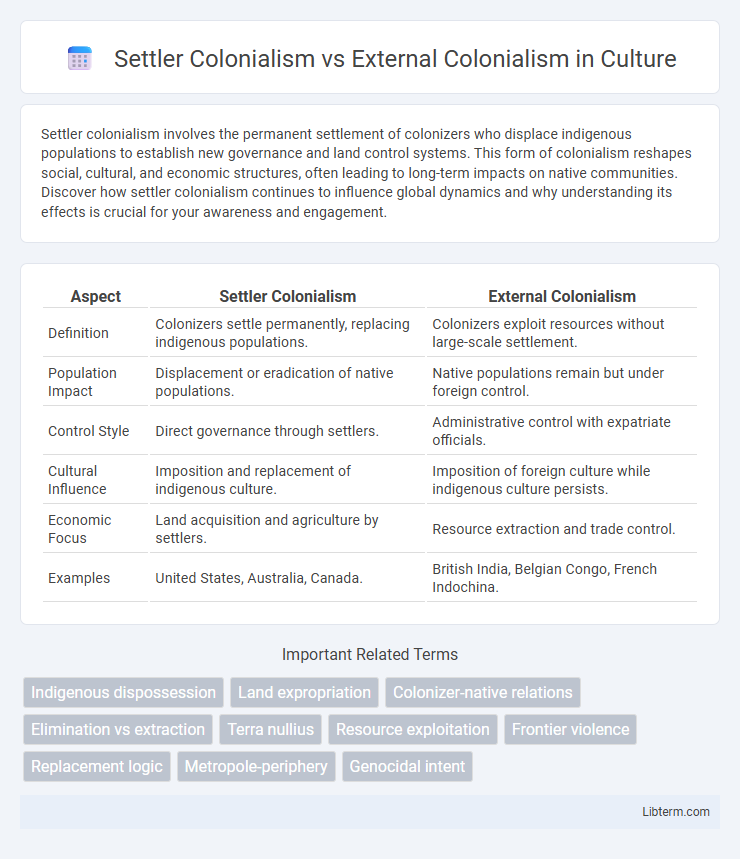Settler colonialism involves the permanent settlement of colonizers who displace indigenous populations to establish new governance and land control systems. This form of colonialism reshapes social, cultural, and economic structures, often leading to long-term impacts on native communities. Discover how settler colonialism continues to influence global dynamics and why understanding its effects is crucial for your awareness and engagement.
Table of Comparison
| Aspect | Settler Colonialism | External Colonialism |
|---|---|---|
| Definition | Colonizers settle permanently, replacing indigenous populations. | Colonizers exploit resources without large-scale settlement. |
| Population Impact | Displacement or eradication of native populations. | Native populations remain but under foreign control. |
| Control Style | Direct governance through settlers. | Administrative control with expatriate officials. |
| Cultural Influence | Imposition and replacement of indigenous culture. | Imposition of foreign culture while indigenous culture persists. |
| Economic Focus | Land acquisition and agriculture by settlers. | Resource extraction and trade control. |
| Examples | United States, Australia, Canada. | British India, Belgian Congo, French Indochina. |
Introduction to Colonialism: Definitions and Types
Colonialism fundamentally involves the domination and exploitation of one territory by another through various methods. Settler colonialism establishes permanent settlements by foreigners who seek to replace indigenous populations, while external colonialism primarily exploits resources and labor without large-scale settlement. Understanding these distinctions is crucial for analyzing historical and contemporary impacts on social, political, and economic structures.
Understanding Settler Colonialism
Settler colonialism involves the sustained occupation and replacement of indigenous populations by settlers who establish permanent residences and assert sovereignty over the land. Unlike external colonialism, which primarily exploits resources and governs from a distance, settler colonialism is characterized by the systematic displacement and erasure of native peoples to create a new societal order. Understanding settler colonialism requires analyzing its ongoing impact on indigenous land rights, cultural survival, and state formation processes.
Key Features of External Colonialism
External colonialism involves the control and exploitation of a territory by a distant foreign power, primarily for economic extraction and strategic advantage. Key features include limited settlement by the colonizing population, reliance on local intermediaries for administration, and the imposition of foreign political and economic structures without significant demographic displacement. This form of colonialism often maintains the indigenous social fabric while subordinating it to external interests.
Historical Contexts and Emergence
Settler colonialism emerged primarily during the 17th to 19th centuries as European powers established permanent settlements in territories such as North America, Australia, and South Africa, where colonizers sought to replace indigenous populations and establish new societies. External colonialism, on the other hand, involved control over distant territories through economic exploitation and political domination without significant settlement, exemplified by British rule in India and the Belgian Congo during the 19th and early 20th centuries. These distinct colonial models reflect different historical contexts of imperial expansion, with settler colonialism focused on land dispossession and demographic transformation, while external colonialism emphasized resource extraction and administrative control.
Motivations Behind Settler vs External Colonialism
Settler colonialism is primarily motivated by the desire to establish a permanent population and control over land, driven by economic opportunity, resource extraction, and political dominance. External colonialism focuses on exploiting local labor and resources while maintaining control through political and military presence without significant settler migration. The motivations behind settler colonialism intertwine land appropriation with cultural assimilation, whereas external colonialism emphasizes economic exploitation and strategic advantage.
Impacts on Indigenous Populations
Settler colonialism often results in the displacement, marginalization, and cultural erasure of Indigenous populations as settlers establish permanent communities and assert sovereignty over land. External colonialism typically exploits Indigenous communities through resource extraction, forced labor, and economic dependency, while maintaining colonial power structures without extensive settler migration. Both forms of colonialism contribute to long-lasting socioeconomic inequalities, health disparities, and loss of Indigenous languages and traditions.
Land, Resources, and Dispossession
Settler colonialism involves the permanent occupation and transformation of land through the displacement of indigenous populations to establish new, enduring societies. External colonialism primarily exploits land and resources without significant settlement, focusing on extraction and economic control while maintaining the colonizers' homeland. Dispossession in settler colonialism is structural and ongoing, erasing indigenous presence, whereas in external colonialism it tends to be more extractive and temporary, centered on resource depletion and labor exploitation.
Resistance and Persistence: Indigenous Responses
Indigenous responses to settler colonialism emphasize persistent resistance through cultural preservation, land reclamation, and legal challenges that assert sovereignty and self-determination. In contrast, resistance to external colonialism often involves organized political movements, diplomatic negotiations, and armed uprisings aimed at expelling foreign powers while reclaiming national independence. Both forms of colonialism provoke resilient indigenous strategies rooted in maintaining identity and challenging colonial control.
Legacy in Contemporary Societies
Settler colonialism's legacy manifests in ongoing land dispossession, cultural erasure, and systemic inequalities within Indigenous populations, profoundly shaping national identities and social hierarchies. External colonialism often leaves behind extractive economies and dependent infrastructures that hinder post-colonial development and exacerbate socioeconomic disparities. Both legacies complicate contemporary efforts toward reconciliation, social justice, and equitable governance in former colonies.
Conclusion: Lessons and Ongoing Debates
Settler colonialism and external colonialism differ fundamentally in their goals and structures, with settler colonialism aiming for permanent territorial control and external colonialism focused on resource extraction and political dominance. The enduring legacies of settler colonialism continue to provoke debates on sovereignty, indigenous rights, and historical justice, emphasizing reparations and decolonization. Understanding these distinctions informs contemporary policy and activism aiming to address ongoing inequalities and promote indigenous self-determination.
Settler Colonialism Infographic

 libterm.com
libterm.com